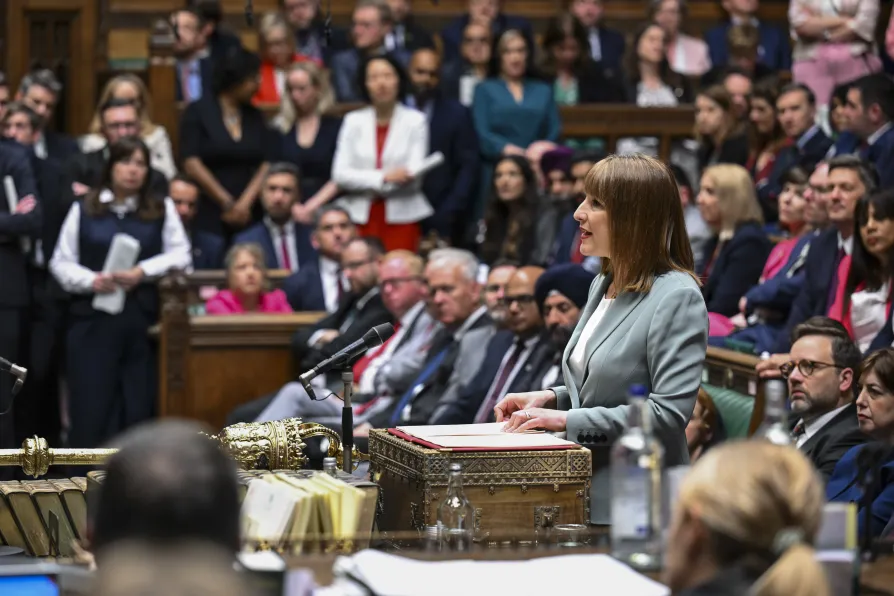Campaigners weigh in on Chancellor's spending review

 House of Commons Handout photo issued by the House of Commons of Chancellor of the Exchequer Rachel Reeves delivers her Government's spending review to MPs in the House of Commons, London, June 11, 2025
House of Commons Handout photo issued by the House of Commons of Chancellor of the Exchequer Rachel Reeves delivers her Government's spending review to MPs in the House of Commons, London, June 11, 2025
CAMPAIGNERS insisted “we need benefits not bombs” yesterday in response to Chancellor Rachel Reeves’s spending review that prioritised “weapons for war at the expense of disabled people’s lives.”
Setting out budgets for government departments in the Commons, the Chancellor confirmed that military spending will rise to 2.6 per cent of GDP by April 2027 — a boost she says was made possible by slashing the overseas aid budget.
More than £6 billion will be spent on upgrades to nuclear submarine production, and £4.5bn on munitions to ”make Britain a defence industrial superpower.”
Unite general secretary Sharon Graham suggested that the government look at the implementation of a wealth tax rather than fund increases for some departments through cuts elsewhere.
“Instead of the presentation of false trade-offs — defence but not international aid, cuts to disability benefits but no tax on the super-rich… Labour needs to set out a clear vision that people can see and feel and then they need to finance it,” she said.
Some £7bn will be spent on funding 14,000 new prison places, while an extra £2bn will be allocated to the police.
The Border Security Command, which was launched to crack down on small boat crossings, will receive an extra £280m a year.
The Chancellor stated that the government will stop using hotels to accommodate asylum-seekers before the end of this parliament.
Care4Calais CEO Steve Smith said: “Moving from former commercial hotels to accommodation situated within communities would be welcome, but what the government really needs to end is the for-profit asylum accommodation model that has created billionaires.”
Labour re-committed to its £13.2bn Warm Homes Plan, which it said will upgrade millions of homes and cut up to £600 a year off bills.
Simon Francis, co-ordinator of the End Fuel Poverty Coalition, described it as a “huge step forward for households suffering in cold damp homes.”
But he warned that energy bills are still too high and urged the government to support homes in fuel poverty through implementing a “social tariff.”
Ms Reeves confirmed a £39bn package for affordable housing over the next decade, and direct funding to support house building, particularly for social rent.
She said another £10bn will be used “ to crowd in private investments and unlock hundreds of thousands more homes.”
Independent MP Jeremy Corbyn said: “The government must tell us: will its latest announcement result in proper social housing or subsidies for private developers?
“When will it get to the heart of the housing crisis and control rents?”
The former Labour leader slammed the government for refusing to scrap the two-child benefit cap and inflicting welfare cuts: “The government could, if it wanted to, tax the wealthiest in our society.”
In a letter to the Chancellor, the SNP’s Kirsty Blackman said that if Labour made moves to abolish the cap, as well as the bedroom tax, like in Scotland, and raise the child element of universal credit, it could lift 1.84 million families out of poverty.
The government announced it would step up support for local councils.
But Unison general secretary Christina McAnea warned that “their financial situation is so dire, it’ll take much more than £3.4bn to put them back on track.
“It’s disappointing too there was no extra cash announced to stop disability benefits being slashed.
“Cuts to personal independent payments (PIP) mostly affect those in work and will make it much harder for them to stay in their jobs.”
The government announced in March that it plans to slash £5bn a year in welfare cuts by 2030.
The Resolution Foundation think tank estimated that the tightening of PIP eligibility alone could mean up to 1.2m people will lose support between £4,200 and £6,300 per year by 2030.
Paula Peters from Disabled People Against Cuts said: “The spending review shows where the government priorities lie - building nuclear submarines and weapons for war at the expense of disabled people’s lives.
“We need welfare not warfare. We need benefits not bombs.”
Tom Marsland from disability charity Sense noted that the review had a lack of focus on social care.
He said: “The social care system should be a lifeline for disabled people.
”It should be working alongside the NHS to deliver vital services. But for years it has been underfunded, left to lag behind until now it is utterly broken.”
The Chancellor announced a £29bn funding boost for the NHS, and £10bn to be invested in technology “ to bring our analog health system into the digital age.”
EveryDoctor chief executive Dr Julia Patterson said: “It’s good to see the Chancellor taking the concerns of the public seriously, and committing investment to the NHS.
“But we have a very serious question for Rachel Reeves — how much of this money will end up in the pockets of private shareholders?
“After all, this Labour government is choosing to advance NHS privatisation and choosing to funnel billions of pounds into private companies.”
Dr John Puntis from Keep Our NHS Public said: “Should the average historic annual spending increase on the NHS have been maintained rather than reduced from 2009 onwards, the NHS would have received an additional £423bn.
“This particular financial ‘black hole’ is ignored by a Labour government that wrongly continues to look for new technology and unrealistic efficiency saving targets to make up for this deficit.”
Wales First Minister Eluned Morgan welcomed the billions of pounds in investment for the country, including £4.9bn extra in consequential funding across three years and £445m for rail infrastructure over 10 years.










